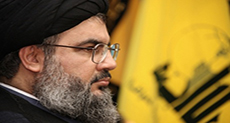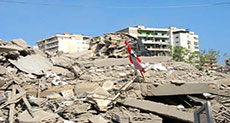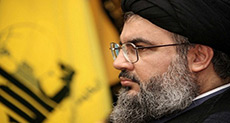Hizbullah finalizes preparations for celebrations of last year`s `divine victory`
Source: AFP, 14-8-2007
BEIRUT: Hizbullah celebrates this week the anniversary of its "divine victory" in its war with “Israel”, as the country remains paralyzed by deep political and economic crises. "This is a great Lebanese national anniversary," Hussein Rahhal, spokesman for Hizbullah, which held out against the “Israeli” military for 34 days in July and August 2006, told AFP.
The blistering war launched by "Israel" cost more than 1,200 lives in Lebanon, mostly civilians and 160 in “Israel”, mostly soldiers.
The war broke out when “Israel” used a border incident, in which Hizbullah captured two soldiers in a bid to secure a prisoner swap, as a pretext to launch its war. “Israel” launched a ferocious air, sea and land assault that left Lebanon`s infrastructure in tatters and destroyed thousands of homes until a UN-brokered cessation of hostilities came into effect on August 14.
"This victory proved that Lebanon can defend itself and it greatly affected the Zionist entity which has since changed its top military leaders," Rahhal said.
One of “Israel’s” stated aims in the war was to eliminate Hizbullah`s capacity to fire rockets, thousands of which were launched at the Jewish (Zionist) state during the conflict.
UN Security Council Resolution 1701, which halted the war, calls for the disarmament of all militias in Lebanon. But Hizbullah said it would not give up its weapons as long as there was a weak Lebanese state incapable of defending itself from “Israel”.
"We have an enemy that is always ready to carry out aggression," Rahhal said, adding that "we are always ready to confront any renewed attacks."
He said the capability of his group to hold out against the Jewish (Zionist) state`s mighty army "has proven that ‘Israel’ is incapable of winning any battle in Lebanon or elsewhere in the region." Apart from Hizbullah`s celebration, no official events to mark the cease-fire are planned across the country, which has been in the throes of a political and economic crisis over the past year.
The army, meanwhile, is engaged in a deadly showdown with Islamist militants at a Palestinian refugee camp.
Beirut`s political scene has witnessed sharp political disputes since the war, with Parliament paralyzed for nearly nine months because of a deadlock between the Western-backed government and the national Lebanese opposition.
And the Lebanese remain nervous after a string of attacks targeting prominent Lebanese figures. There is also fear that the turmoil could worsen in the run-up to a September deadline for electing a new president.
The economic fallout from the war has been enormous.
Tourists and foreign investors have stayed away from Lebanon for a second straight year, and the economy of the country - which has a public debt of $41 billion - shrank by five percent.
Material damage from the war stands at an estimated $3.6 billion, not counting lost economic revenues.
Much of the battered infrastructure has been restored, as billions of dollars in foreign aid flowed in, but the rebuilding of homes has been slow.
In Beirut`s southern suburbs, where massive destruction is still apparent a year later, Hizbullah is putting on a brave and massive reconstruction project. It has organized an elaborate sound and light exhibit showcasing war souvenirs to highlight “Israel’s” "crushing defeat."
Hizbullah`s leader Sayyed Hassan Nasrallah, a hero for many Arabs but public enemy No. 1 for “Israel”, is due to make a televised speech before a large rally in the suburbs to mark the anniversary on Tuesday.




